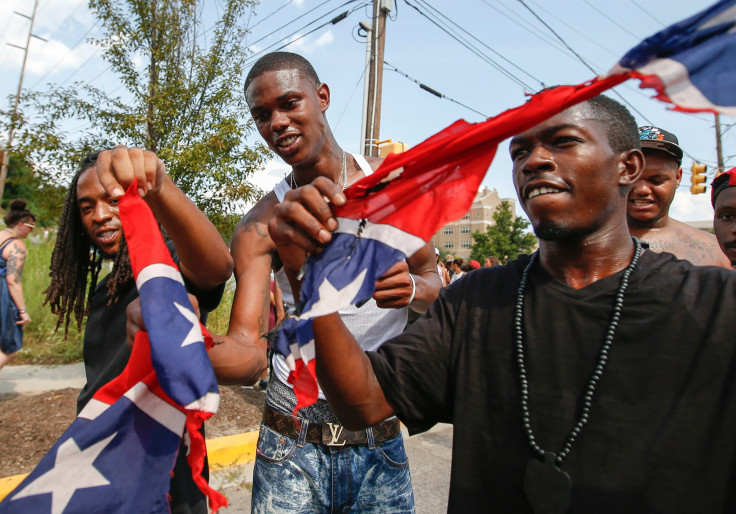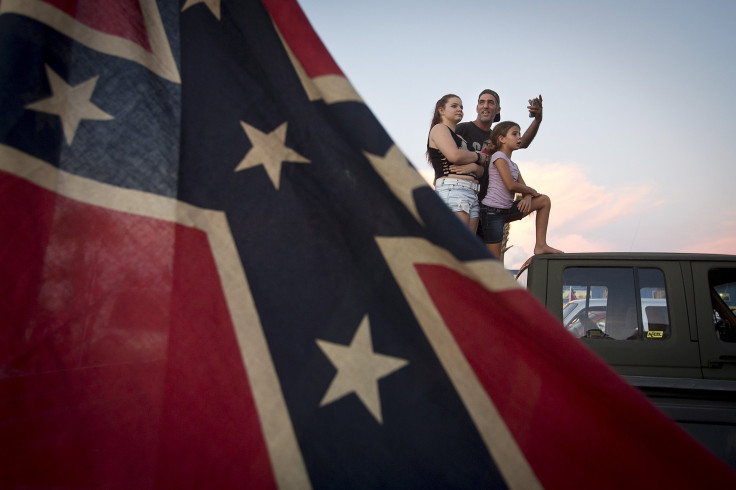Confederate Flag Controversy: More US Schools Consider Bans On Display Of Southern Symbol As Charleston Unveils New Policy

Weeks after a white gunman opened fire in a historic black church in South Carolina, the Charleston County School District this week updated its code of conduct for the 2015-2016 school year, which began Monday, to include a ban on the Confederate flag. The policy prohibits students from wearing clothing, jewelry or other apparel featuring images of the rebel banner.
District officials said the policy change was made “in light of a year marred with racially divisive and tragic events,” the Charleston Post and Courier reported Tuesday. The ban also covers prominent displays of the flag on vehicles driven to and parked on school grounds.
Schools across the South and throughout the country are spelling out their Confederate flag policies amid a national discussion about whether all public displays of the emblem should be taken down to help heal long-standing racial wounds. Opponents of the rebel banner said it represents hate among blacks and whites because of how modern white supremacist groups have embraced it, and could send a message of disrespect to black students and their families. Some school officials who have defended the flag, however, insist that banning it would violate First Amendment rights. A debate is unfolding in the aftermath of a hate-fueled shooting earlier this year in Charleston, South Carolina, that saw a Confederate flag supporter shoot dead nine black parishioners in a historic African-American church.
Support for Confederate flag bans in public schools is mixed, even after the South Carolina tragedy. That was evident at last month's convention of the National Education Association in Orlando, Florida. The union's delegates unanimously supported a broadly worded resolution committing the organization to fighting institutional racism, only to hold a lengthy and contentious debate over a separate measure about bans on Confederate flags in public schools, Education Week reported. The measure passed by a voice vote of about 7,000 delegates.
School officials in places such as New York, Massachusetts, Texas and Florida have been dealing with the use of Confederate flags and racially offensive symbols for years, but the debate has found new life after the Charleston shooting. A high school in Rutherford County, Tennessee, last week refused to ban the Confederate battle flag from being displayed on campus, even after a black student expressed discomfort at the sight of it, according to a report by local ABC affiliate WKRN-TV. Meanwhile, students in Hamblen County, Tennessee, schools are being told to leave their Confederate flags at home, local CBS affiliate WVLT-TV reported. In June, a school board committee in Arkansas voted to change Southside High School’s “Rebels” nickname and stopped using the Confederate anthem “Dixie” as its fight song. Petitions quickly sprang up online with people pushing for and against the ban.
Sam Odle, vice president of Indianapolis Public Schools, a district of more than 23,000 students that has faced problems of segregation and inequality for African-American students, said there is too much at stake to allow Confederate flags to derail learning opportunities for disadvantaged students. White students in the U.S. have long outperformed black students regardless of income level, and education activists said the achievement gap has persisted because of enduring social justice inequalities, among other factors.
“Any kind of symbol that would create an unsettling environment toward students is something that we would be opposed to,” said Odle, who is African-American. “If we don’t educate kids successfully, we know we are just sentencing them to a life of poverty and other problems. And that’s really immoral.”
Dylann Roof, the white man charged in the Charleston deaths, of nine African-American members of the Emanuel AME Church in June, had posted photos of himself online waving the Confederate flag. State lawmakers in South Carolina voted to remove the flag from its perch on statehouse grounds last month, as other municipal and state officials in the U.S. considered removing their symbols.

Opponents of policies banning the symbols in schools have asserted that bans send the wrong message to students about the First Amendment’s free speech protections. The First Amendment Center, a Washington, D.C., area-based nonprofit advocating awareness of constitutional rights in schools, said educators should ban and discipline students for wearing or displaying Confederate symbols if they “can reasonably forecast that the wearing of the Confederate flag will lead to a substantial disruption of the school environment.”
While U.S. District Courts have backed school bans of racially divisive symbols when they've been challenged in the last decade, some bans have been struck down for not applying evenhandedly to other potentially offensive symbols, the Center said.
After the Charleston shooting, school officials across the country should clarify their policies on the flag and find teachable moments in the controversy, said Kenya Campbell, secretary of the American Federation of Teachers’ union in Maryland.
“Schools are sometimes forced to carry the heavy burden of taking on social issues that find their way into our classrooms,” Campbell said. “When considering recent bans on student displays of the Confederate flag, the goal is to keep our schools safe and free of unnecessary distractions that could lead to detrimental events.”
Confederate symbols are more visible in Hurley, Virginia, a small rural town of 23,000 that is 96 percent white and 2.9 black, than in other communities that have considered or instituted bans. The local high school’s teams are known as the Rebels and the school logo features a Confederate flag waving from a sword.
“Since all of this has come about, our community has stood behind the logo and the flag,” Hurley High principal Pamela Dotson told The Huffington Post last month. “If you did a survey, I doubt you’d find a single person who’d want to change it.”
© Copyright IBTimes 2024. All rights reserved.





















